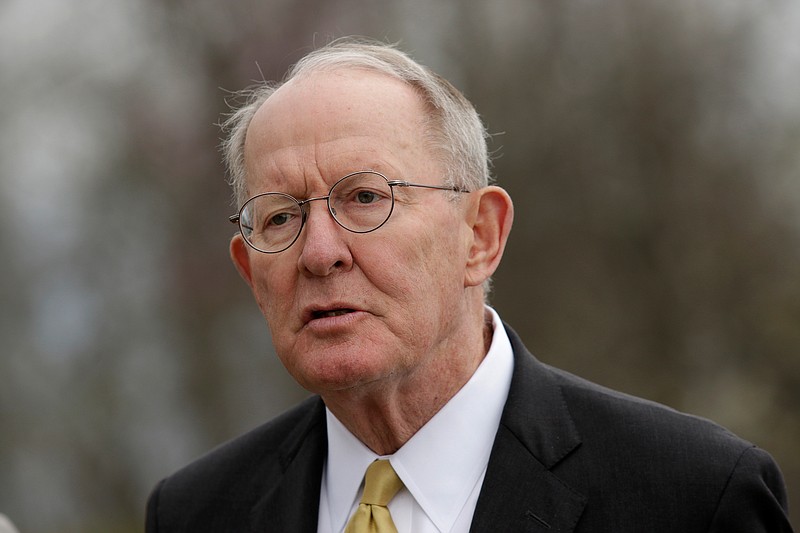As one of the leading states for attracting foreign direct investment and boosting its foreign exports, Tennessee likely will be among the hardest hit states from President Trump's plan to impose more tariffs and to renegotiate the North American Free Trade Agreement (NAFTA), Tennessee's senior senator and state economists said Tuesday.
"The worst idea coming out of Washington right now is all this talk about tariffs," U.S. Sen. Lamar Alexander, R-Tenn., told the Chattanooga Kiwanis Club on Tuesday. "The president has been a good listener and has invited me two or three times to discussions about these trade issues, but unfortunately I have been unable to persuade him on anything yet."
In response to Trump's announcement of a 10 percent tariff on aluminum imports and a 25 percent tariff on steel, Electrolux put its plans for a $250 million plant expansion in Springfield, Tenn., on hold and LG Electronics announced plans to raise prices on the washing machines made in Tennessee and other U.S. locations.
Both Bridgestone in Nashville and Hankook in Clarksville also expect to raise prices and could limit production of steel belted tires at their Tennessee plants because of the steel tariffs.
"These tariffs take $28 million off of Bridgestone's bottom line and makes it harder for them to compete," Alexander said.
Alexander said he hopes Trump will change his mind about more protectionist measures, which he said risk a costly trade war that will only hurt workers and consumers.
"He should learn from the mistakes of President George W. Bush, who imposed steel tariffs in 2003 only to realize they ended up costing more jobs than they protected and scrapping the idea a year later," Alexander said.
But Tuesday, the Trump administration escalated its aggressive approach to trade by proposing 25 percent tariffs on $50 billion in Chinese imports to protest Beijing's alleged theft of American technology. The Office of the U.S. Trade Representative issued a list targeting 1,300 Chinese products, including industrial robots and telecommunications equipment.
Steven Livingston, a professor of political science at Middle Tennessee State University and editor of Global Commerce, said "Tennessee would end up as a huge loser" if the metals tariffs remain and the United States pulls out of the North American Free Trade Agreement or engages in a trade war with China, the world's biggest economy.
"Since we don't have any steel or aluminum plants in our state, it's really hard to come up with any advantage for a state like Tennessee, but it is easy to see a lot of problems from these tariffs," Livingston said. "Tariffs are going to raise prices and, if they interrupt supply chains, it is going to be very difficult for some of these companies to operate here. A trade war would be especially hard on Tennessee."
Dan Ujczo, an international and customs lawyer who has worked with a number of Tennessee companies, said the steel tariffs will likely hit the hardest on automotive suppliers farther down the chain, including tier 3 and tier 4 suppliers who provide parts for other parts suppliers for the original equipment makers.
"If these types of smaller suppliers can't get their supply or have to pay too high of a price to operate in the U.S., that could really shut down assembly lines," Ujzco said. "Many of those who would be hurt the worst are the very workers that probably voted for Trump and yet they may get hit the hardest."
But President Trump has said he simply wants "free, fair and smart trade.
"Our steel and aluminum industries (and many others) have been decimated by decades of unfair trade and bad policy with countries from around the world," Trump said in a tweet earlier this year. "We must not let our country, companies and workers be taken advantage of any longer."
Trump has backed off on steel tariffs for some countries, including Canada, Mexico, Argentina, Australia, Brazil, the European Union, and South Korea, while he renegotiates trade deals with those countries.
Ujzco said he was surprised Japan was not included in the exemptions to the steel tariffs since Japanese firms such as Nissan, Toyota, Honda and Denso have been big investors in the United States, including more than 180 manufacturing facilities by Japanese companies in Tennessee alone.
For most of the past three years, Tennessee has ranked No. 1 among all U.S. states for foreign direct investment job commitments, according to the IBM Global Locations Trends.
There are approximately 926 foreign-based companies with operations in Tennessee with more than 127,000 jobs, according to the Tennessee Department of Economic and Community Development.
Contact Dave Flessner at dflessner@timesfreepress.com or at 757-6340.
